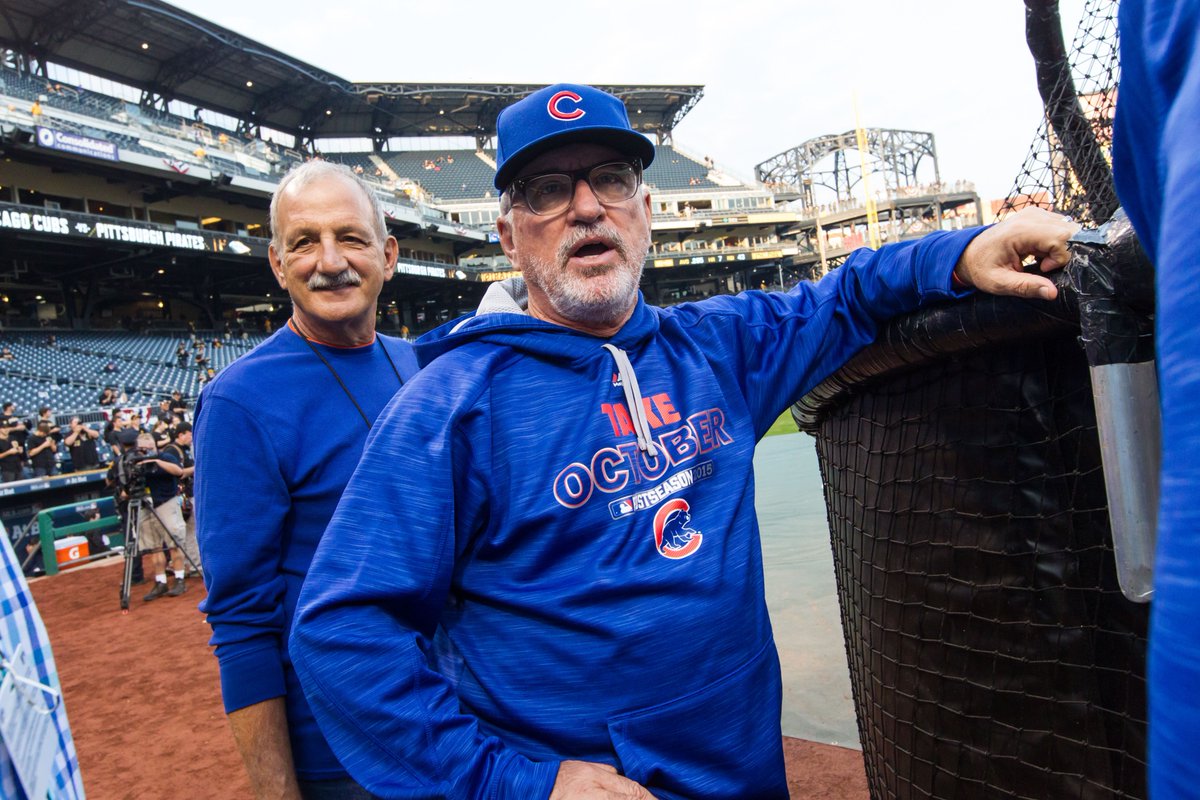
By Bob Nightengale |
He never put on a baseball uniform.
He didn’t manage or coach.
He never executed a trade.
Yet, Ken Ravizza was one of the greatest behind-the-scenes giants in the baseball industry, a godfather of mental skills coaching, who has worked the past three years for the Chicago Cubs and his longtime friend, Cubs manager Joe Maddon.
He died Sunday evening at the age of 70 after suffering a heart attack six days ago.
At a time the mental side of the game was viewed through a particularly macho lens, Ravizza cared not about optics, even installing a replica toilet in a dugout so players could “flush” their negative thoughts.
As word of his passing spread Monday, tributes poured in from a cross-section of baseball, from his old colleagues to All-Stars such as Dodgers third baseman Justin Turner.
“I always envisioned the day that his picture would be on the scoreboard, he’d throw out the first pitch, and then he’d walk away,’’ said Seattle Mariners farm director Andy McKay, 47, who was mentored by Ravizza since the age of 21. “Now, we’re going to have this (crummy) picture on the scoreboard that says, ‘Rest in Peace.’
“For what he’s done for baseball, and mostly what he’s done for people, Ken really deserved some type of formal acknowledgement. For him not getting that is really hard for me right now. But Ken’s legacy is way too big to die. It won’t stop. There are so many people that he influenced.’’
Ravizza was invaluable to coaches and managers throughout Southern California. Originally a mental-skills coach that worked primarily with the Cal State Fullerton gymnastics program, he began working with Augie Garrido and his baseball program, and eventually began working for the Los Angeles Angels and Dodgers, before moving on with Maddon to the Tampa Bay Rays and Cubs.
“He was a great human being who impacted so many people and players in so many ways,’’ said Colorado Rockies minor league manager Jerry Weinstein, who has known Ravizza for 35 years. “When I met him in 1983 working for Sacramento City College, he changed my life. He taught me how to interface and deal with people get the most out of people, and provide guidelines how to live your life.
“Coaches and athletes are very skeptical. They deal with more of the X’s and O’s and not the cerebral part. But he wasn’t one of those guys that did all of his mumble-jumble. He generated immediate trust. Everyone trusted and respected this man. His teachings resonated throughout baseball.
“He was a mentor to so many of us. Just an ego-less, fabulous person. What a gentle soul.’’
Dave Snow, the legendary former Long Beach State baseball coach, says that Ravizza’s influence even helped him meet the woman of his dreams, Lana, his wife of 18 years, by reading one of his books. He met Ravizza when he was the assistant pitching coach at Cal State Fullerton, and says that Ravizza was influential in their 1984 College World Series title.
“He helped me become a better coach, taught me how to communicate better with our athletes, and connect the physical work with the mental game,” says Snow. “He touched so many people in a lot of ways. It’s almost mind-boggling to me that he and Augie passed away so close together. I’m dealing with a lot of emotions right now.’’
One of the last times many of his closest friends in baseball saw Ravizza was in spring training. He organized a dinner in Scottsdale, Ariz., with Maddon, Weinstein, Angels coaches Marcel Lachemann, Bill Lachemann and Bobby Knoop and McKay.
“It was one of the most memorable meals I’ve ever had in my life,’’ Weinstein said. “I remember telling Ken, “Come on, this game is 95% physical and 5% mental, but the 5% mental controls the 95% physical.’ He would just laugh.
“I miss him already. I’ve already decided that my new motto is WWKD – what would Ken do?’’
It was Ravizza’s influence that helped ingrain mental skills into the fabric of baseball, with 27 clubs now having a mental skills coach on their staff.
“If you said mental skills before,’’ Maddon said this spring, “that was an absolute sign that you were weak among the old-school guys. Deep down, there were a lot of guys who wanted to talk to them, but they knew that if they were seen talking to them, it would be seen sign as a sign of weakness. And the manager might think less of him.
“To think that psychology is an indicator of weakness, truly is an ignorant statement. When people are fighting it, it’s only because they don’t understand it. It’s no different than your hitting coach, your pitching coach, your infield coach.’’
Ravizza, who has known Maddon since he was a minor league manager in the 1980s with the Angels, played a key role in the Cubs’ first World Series championship in 108 years. He took great pride in Jason Heyward’s speech during the Cubs’ rain delay in Game 7, ultimately culminating with the 2016 World Series title.
“That was one of the most impressive things I’ve seen with Jason Heyward showing the mental toughness in that rain delay to be able to step forward,’’ Ravizza told USA TODAY Sports this spring. “Here he was struggling all year, but at the same time, he showed he had the ability to lead.
“That will never be forgotten.”
Neither will Ravizza.
This article was republished with permission from the original publisher, USA Today. Follow Bob Nightengale on Twitter and Facebook.